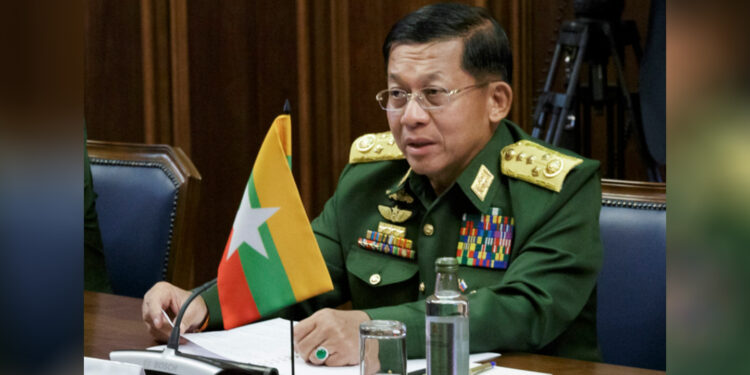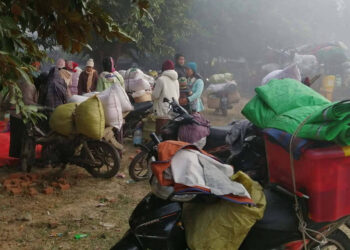Fears are growing in Myanmar that the country is facing another decades-long dictatorship, as coup leader Senior General Min Aung Hlaing has taken on the role of prime minister in his newly formed caretaker government, following in the footsteps of former dictator Ne Win, who ruled the country for 26 years.
Min Aung Hlaing’s self-appointment to the position and the formation of the new government were announced on Sunday as the Southeast Asian country marked sixth months under military rule imposed by his State Administration Council (SAC). On the same day, he said elections would be held by 2023.
Since the military seized power from the democratically elected government led by Daw Aung San Suu Kyi in February, Myanmar has been in turmoil economically, socially and politically. The regime has been struggling to rule the country in the face of popular protest and civil armed resistance. Currently, highly contagious new variants of the coronavirus are battering the country.
The caretaker government is nothing new to Myanmar. In 1958 when the then ruling Anti-Fascist People’s Freedom League (AFPFL) was divided by faction and intrigue, then Prime Minister U Nu handed state power to then military chief General Ne Win after securing a promise from the general that an election would be held in six months. Ne Win agreed and formed a caretaker government, in which he was the prime minister.
However, the election was not held until 1960. Ne Win handed power back to U Nu’s party after its victory at the polls. Two years later, however, the general seized power back through a coup, claiming that the Union of Burma (Myanmar’s former name) was in danger of disintegration under the U Nu government.
After the takeover in 1962, Ne Win held power for 26 years as the supreme leader of the country. He turned what had been Southeast Asia’s most prosperous nation into a poor socialist state, isolating the country from the outside world and pushing it into the ranks of the poorest nations, with Burma earning the UN’s Least Developed Country (LCD) designation in 1987. Ne Win’s dictatorship was toppled by a nationwide popular uprising in 1988, but the protests were brutally cracked down on by the army, paving the way for another period of direct military rule until early 2011.
Given this historical context, the regime’s announcement on Sunday of the caretaker government and its promise to hold elections in two years were met with skepticism.
“The military is back in absolute power for the long haul,” said Bertil Lintner, a Swedish journalist who has been covering Asia for decades.
He said if anyone had any doubts about Min Aung Hlaing’s intentions when he ousted the democratically elected government in Feb. 1, it should now be clear to all that the military grabbed absolute power in order to crush any attempts to establish genuine civilian rule, which was the aim of Daw Aung San Suu Kyi’s ousted National League for Democracy government.
A Yangon-based political analyst who spoke on condition of anonymity due to the sensitivity of the issue said the regime appeared set on holding power for as long as it can. He said that by forming the caretaker government the junta was merely playing another card in its game of misleading the international community into believing that it is not a regime, but rather a government that is holding power temporarily.
“They won’t give it back and it will be really bad for the country,” he said.
Min Aung Hlaing earlier promised he would hand over power to whichever party won the next election. On Sunday, he said the polls would be held in 2023 after the state of emergency period was over.
Last week, the regime officially annulled the 2020 election results, which saw the NLD win a landslide victory, claiming the NLD violated the constitution and election laws. The regime has also been working on disbanding the NLD over the alleged violations.
Given the existing situation, it’s doubtful the NLD will survive to see the election Min Aung Hlaing has promised.
Myanmar’s recent history also shows that the generals rarely keep their promises and are not reliable when it comes to polls.
When the NLD won the general election in 1990, the then military regime didn’t honor the results. They organized an election in 2010 that saw its proxy party win but the polls were internationally dismissed as a sham.
For the 2023 election—if it happens—one possible scenario is that a regime-backed party will have the upper hand with the demise of the NLD.
Lintner said it’s “criminally naïve” to believe that the military will hand over power to a democratically elected, civilian government.
Echoing Lintner, the Yangon-based analyst said parties backed by the regime will contest the vote, with one of them eventually forming a government.
“The regime will make sure that one of them will win,” he said.
You may also like these stories:
Myanmar’s Military Regime Lacks Legitimacy and Capacity to Govern
COVID-19 Unmasks Myanmar Regime’s Callousness and Incompetence
Civilian Killed by Myanmar Military Artillery Strike

















